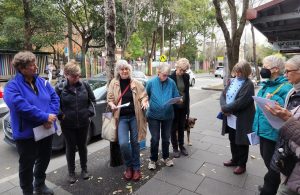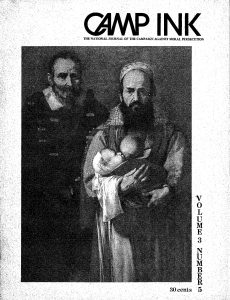 by Penny Saba, July 2022, from Bulletin 5 of 2022 (July)
by Penny Saba, July 2022, from Bulletin 5 of 2022 (July)
Meredith Bergmann, along with her long-term student friends and fellow activists Helen Randerson and Heather Goodall, shared their personal insights and contributions to the many aspects of Glebe during the 60s and 70s. They portrayed a first-hand picture of Radical Glebe during these decades as a centre for growing awareness and action in a multitude of fields.

On a windy Sunday afternoon outside our treasured Gleebooks, we met and headed west, towards 67 Glebe Point Rd where CAMP Inc, Gay Lib, Women’s Lib and Sydney University’s Labor Club were established during the 1960s and ’70s. As a meeting place for Women’s Lib, it represented a second stage of feminism for different aspects independence and respect for women.
From across the road, Helen described the NSW Prisoners’ Action Group’s halfway house during the mid ’70s, where many well-known ex-prisoners resided, along with the Sydney Anarchists House, right next door. It’s looking more subdued now, being no longer covered in the prolific graffiti of past times.
Elsie’s Women’s Refuge in Westmoreland St, first of its kind in Australia, was described by Heather as a major stepping-stone, providing safety and a greater awareness of domestic violence within family situations. As did two adjoining houses in disrepair, initially owned by the church, it became a ‘safe place’, despite some opposition within the community and very crowded facilities.

With so many relevant locations to observe, time didn’t allow us to physically visit all places. We were given, however, a very personalised description by Meredith of the headquarters for the anti-Springboks campaign in Darghan St, the squatters action and the green bans that transpired out of Lyndhurst along with the Glebe Anti-Expressway Committee. Heather shared with us the positive impact that Tranby Aboriginal Co-op College in Mansfield St has had on the availability of educational opportunities for indigenous students with a focus on empowerment and recognition. Further stories were shared at the Forest Lodge Hotel, and mementos of almost 50 years ago were passed around.
It’s easy to understand why the numbers for this walk were so high. Meredith, Helen and Heather shared so much of their early experiences, showing how dedicated they were to so many significant causes, and how much Glebe has played a part in transforming many key aspects of people’s lives.








There are no comments yet. Please leave yours.